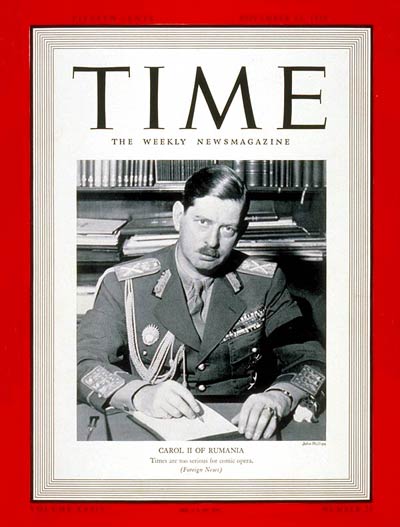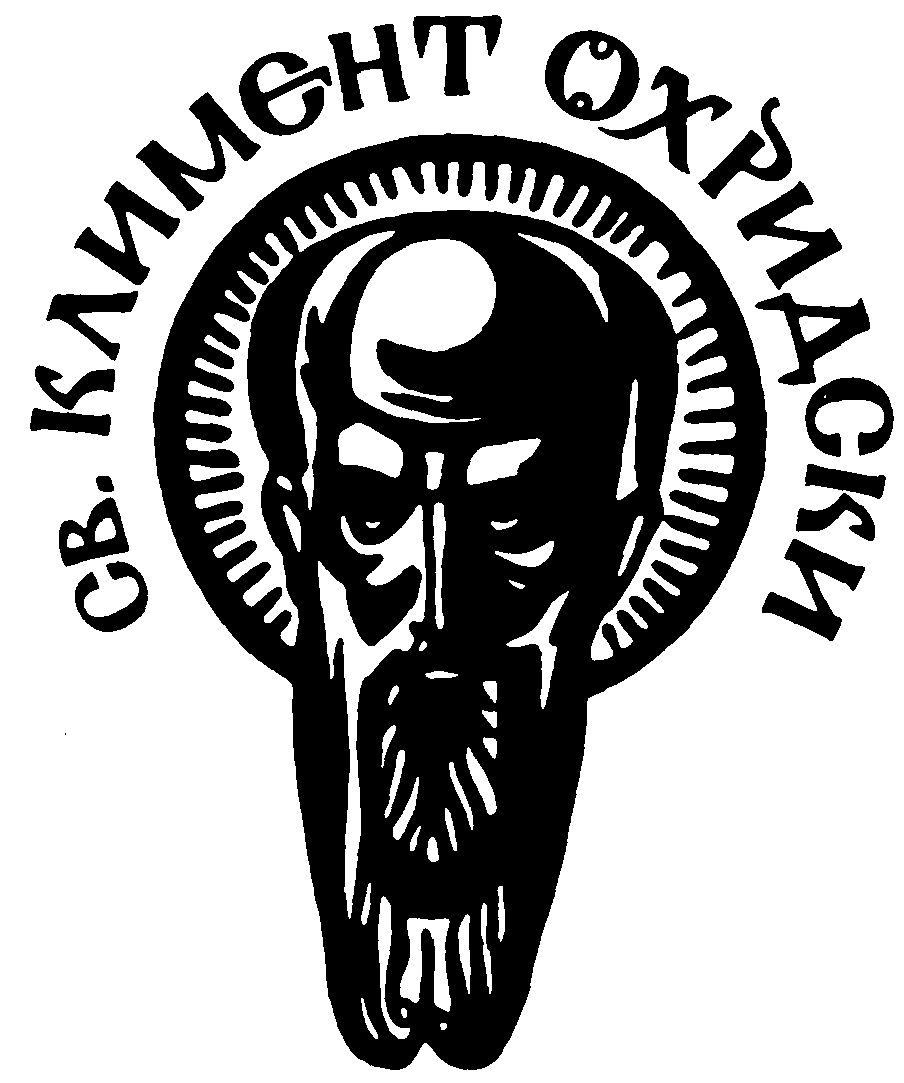RUMANIA: Playboy into Statesman. Time, Monday, Nov. 13, 1939
Early in 1914 two royal matchmakers—Nicholas II, last Tsar of All the Russias, and Marie, then Rumania's British-born Crown Princess—put their heads together and decided it would be nice for both their countries if Marie's elder son Carol and Nicholas' eldest daughter Olga were to marry. To push the romance along, Marie and her husband, Crown Prince Ferdinand, took Carol on a trip to Tsarkoye Selo, the Tsar's winter palace outside St. Petersburg, and later His Imperial Majesty & family visited the Rumanian royalty at Constantsa, on the Black Sea.
Important hitch in the plan, however, was that Prince Carol, who after all had to do the proposing, balked. Then 20 years old, for five years he had been allowed by indulgent parents to taste the pleasures of Bucharest, and already he was beginning to show decided independence in his choice of women. Instead of making up to the rather plain, high-cheek-boned Grand Duchess Olga, he took a fancy to the prettier and more vivacious Grand Duchess Tatiana, the Tsar's second oldest daughter. Since this was not on the schedule, the matchmakers called the whole affair off, and His Imperial Majesty at length showed his distaste not only for Carol but for the entire Rumanian royal family by coining one of his very rare epigrams: "Rumania, bah! It is neither a State nor a nation, but a profession."
But the choosy Balkan Prince had the last laugh on the proud Emperor of Holy Russia. By 1918 Nicholas Romanov had lost his job and his life: by 1930 not only was Carol Hohenzollern very much alive, but after four-and-a-half years of self-exile, he was back in Bucharest and able truthfully to describe his profession to Rumania's census-takers as "mostly a king," secondarily a "farmer." The Tsar lost his throne primarily because he did not know his job. Rumania and the world have become gradually convinced that Farmer-King Carol thoroughly knows all the ins & outs of how to be a King in the Balkans.
Grabby Neighbors. It takes considerable work and ability to be a Balkan ruler nowadays and, particularly in Rumania, the job will not get any easier in the months to come. The old "Playboy of the Balkans," now 46, runs a country of 20,000,000 people whose 113,884 square miles, rich in oil and cereals, are not only the most prosperous in their part of the world, but the most coveted by grabby neighbors.
Of four nations that border on Rumania's frontier (Russia, Hungary, Yugoslavia, Bulgaria) only Yugoslavia can be considered as definitely friendly. The U.S.S.R. has never given up its claim to Bessarabia on the east, and last week Rumanians feared that as soon as Joseph Stalin was through talking with Finnish statesmen, he would send for King Carol's Minister of Foreign Affairs, Grigore Gafencu. Not for a moment has Hungary forgotten that the Treaties of Trianon and Versailles took Transylvania from her and gave it to Rumania. Most irredentist of all is Bulgaria, which has insisted year in & out that the southeastern province of Dobruja, which Rumania grabbed in the Second Balkan War of 1913, be returned.
Not only are Rumania's immediate neighbors sources of apprehension. The Nazis still have their eyes on Rumania and, although Russia's swift move into southern Poland kept Germany from Rumania's boundary, less than two months ago Nazi agents in Rumania assassinated Premier Armand Calinescu and attempted a coup in Bucharest. Meantime, Russia continues to stir up Communist agitation among Rumanian peasants. Meantime, Britain and France—who have guaranteed Rumania's borders and own a big part of her oil wells—compete against the German trade agreement for a greater share of Rumanian produce.
Paris of the East. Small wonder it is that the lobbies and bar of Bucharest's famed Athénée Palace swarm night & day with as conniving a group of spies, agents, buyers, diplomats, eavesdropping newsmen as ever inhabited a Grand Hotel. On the twisting Calea Victoriei—less than 20 years ago a thoroughfare distinguished for its dust in summer and its mud in winter—intriguing Frenchmen rub shoulders with scheming Germans, plotting Britons encounter counterplotting Russians.
No city is more nervous, but no European capital is today gayer or more frivolous. With no blackouts, no curfews, no ration cards to worry about, Bucharest's 900,000 sophisticated, easygoing, sensuous citizens are at last earning the title which the city long ago assumed but never quite deserved—"Paris of the East." The Nippon bar, hangout of lonely, pleasure-bent males, and the Colorado, more elegant and respectable cabaret, keep open nightly until 5:30 a.m. On the less naughty side of Bucharest serious politicians relax at famed Café Capsa. The big, swanky outdoor terrace of the Cercul Militar (Army Club), facing the Calea Victoriei, is filled nightly with resplendently uniformed officers and smartly turned-out women. Caviar, juicy steaks, pastries oozing with whipped cream—all verboten in many a war-nervous area—can be ordered to the tune of a gypsy orchestra. In the shops can be bought everything from U. S.-made toothpaste to the finest wines from the King's own vineyards.
With warring nations bidding for her produce, Bucharest's stockmarket is booming as rarely before. Rumania's currency is controlled, but a Black Bourse operates full-blast and the Bucharest visitor with valuta (foreign exchange) in his pocket has no trouble at all in getting in touch with men quite willing to give him two or three times the "official" rate of exchange. (Example: officially there are 140 leis to $1; on the Black Bourse $1 will bring as high as 400.) The jewel mart is doing a land-office business with those Polish aristocrats who could bring only such small objects along as they could carry in their hands and pockets.
Meanwhile, Bucharest is having such a face-lifting that the city's Polish refugees, fresh from Warsaw, wondered if Nazi bombers had not paid it a visit. The Calea Victoriei is half boarded up as the street's smaller twists are being straightened out. A wide boulevard is being cut through the old Jewish bazaar quarter. The River Dambovitsa, long an open sewer dividing the city, is being covered over by a broad thoroughfare.
A major operation is also being performed on the King's Palace which is to have two new symmetrical wings and, when completed, will look like a small Buckingham. To complete the work in record time, night shifts work under floodlights. Throughout the city, as new buildings go up, old ones have come down, but around the Palace whole blocks have been demolished to make a new Royal Square between the Calea Victoriei and Boulevard Bratianu, a quarter of a mile away. Centerpiece of this new square will be the equestrian statue of Rumania's first Hohenzollern King, Carol I. Meanwhile, Carol II is staying at Cotroceni Palace, his late mother's favorite home, on the outskirts of town.
Since 1938 Carol has not only been King but dictator of Rumania. That he should undertake all this reconstruction in such perilous times is perhaps proof enough of his faith in his ability to maintain Rumania as a going concern for some time to come.
Royal Rake. Carol's life is the story of the Rake's Progress in reverse, a tale of the dissipated, headstrong young man who got better as he got older, winding up a serious-minded, at times even enlightened, ruler. In point of fact, Carol was never a black sheep. He was as good a product as was likely to come out of the court in which he was reared—a court which reeked with corruption and vice, which was ruled by a conniving and ruthless camarilla, in which mother was pitted against son, brother against brother, sister against sister.
Carol's father, Prince (later King) Ferdinand, anticipated his son's later escapades by falling in love with a pretty young poetess, Helen Vacarescu; according to one version he eloped to Venice and renounced his right to the throne. Finally persuaded by his uncle, old King Carol I, to return to Bucharest, he was then married to Princess Marie, daughter of the Duke of Edinburgh and Saxe-Coburg-Gotha, granddaughter of Britain's Queen Victoria.
Plotting Mother. A blushing 17-year-old girl at her marriage, Princess Marie was not long in mastering the arts of Balkan intrigue. She quickly allied herself with the powerful bourgeois Bratianu family which had founded the modern Kingdom of Rumania by revolting against Turkish rule in 1877. Princess Marie's favorite soon became Prince Barbu Stirbey, Chamberlain of the King's Household and, more important, brother-in-law of Ion Bratianu. Prince Ferdinand came to the throne in 1914, a weakling from the start, and thereafter the real power in Rumania was lodged in the hands of the Bratianus, Prince Stirbey and Queen Marie.
No project was too ambitious or too devious for the Queen. She rode roughshod over her Hohenzollern husband's natural inclinations and brought Rumania into the Allied side of the World War. She later marched into the Versailles Peace Conference in 1919 and marched out with a treaty which doubled Rumania's size at the expense of Russia and Hungary.
Her children figured largely in her scheme to gain more power. One daughter (Marie) she married to Yugoslavia; another (Elizabeth) to Greece. She hoped that a third (Ileana) would marry Bulgaria, but King Boris did not press his suit when it was gossiped about that Ileana was Prince Stirbey's, and not King Ferdinand's, daughter. Through her daughters Queen Marie hoped to exert powerful influence throughout the Balkans; through her eldest son she planned on ruling Rumania.
Wedding Bells. Only fault with this reasoning was that Son Carol refused to play. A year or so of training at Potsdam, a tutor in the person of Professor Nicholas Jorga, a dogged old National Democrat who was against virtually everything the Bratianus stood for—these put unexpected backbone into the young Prince. Mother Marie was too busy hatching plots to notice that Son Carol was developing a mind of his own. She had a first glimpse of Carol's stubbornness at the Court of the Tsar. She got a big dose of it when, in World War I, the young Prince, serving as a Colonel, left his regiment, journeyed to Odessa, Russia, and there, after marrying 22-year-old Zizi Lambrino, the dashing daughter of a Rumanian officer, renounced all his rights to the throne.
No one is more severe toward a rake than a reformed rake, and King Ferdinand punished his son with a 75-day confinement in his barracks. The marriage was promptly annulled, and Mlle Lambrino was pensioned off ($12,000 a year) and banished from the country. A few months later she gave birth to a boy, named him Mircea. Mother & son went to Paris, and later she got another big settlement. Carol was soon sent on a trip to Egypt, India and Japan, only to find on his return that his family had picked out for him a beautiful and royal bride-to-be —Helen, sister of George II, the present King of Greece. They were married in 1921, and seven months later Princess Helen gave birth to Mihai, who fortnight ago celebrated his 18th birthday, and who was last week given a new palace near his father's.
Enter "Bibi." In a marriage of convenience forced upon him by his family, Carol had not the slightest intention of remaining a faithful or even a discreet husband. He made no attempt to disguise his many extra-marital affairs, and few Rumanians, to whom mistresses are certainly not unusual,* would have given his peccadilloes a second thought had not His Royal Highness happened one night in the Cercul Militar to meet a voluptuous young woman named Magda Lupescu. Daughter of a small shopkeeper, divorced wife of an Army lieutenant, she also happened to be half-Jewish in a country stridently antiSemitic. Notwithstanding, Carol fell for "Bibi"—as he called the titian-haired Magda—and for 16 years, through thick & thin, on and off the throne, in exile or at home, he was to stick by her and she by him.
He ran away with her in 1925, and in the very hotel from which his father had once renounced his throne, he was said to have penned a similar letter. Mihai, Carol's son, was declared next in succession. Then King Ferdinand died, and little Mihai was put on the throne surrounded by a regency consisting of his uncle, Prince Nicholas, Patriarch Miron Cristea, Supreme Court President George Buzdugan.
Return. But the Bratianus were slipping. Post-War land reforms gave the peasants thousands of acres. After Versailles, democracy was on the wax in Europe and, notwithstanding Rumania's notorious balloting methods, a peasant leader named Juliu Maniu eventually won the premiership in 1929. When his reforms were further blocked by the Bratianu court clique, he conceived a plan to dethrone Mihai, crown Carol and get rid of Dowager Queen Marie and Prince Stirbey for good.
Carol landed at the Bucharest airport from Paris on June 6, 1930 and Rumania went wild with joy. There was to be a reconciliation between the new King and the Princess Helen. Magda was to be dropped.
But all did not work out as Premier Maniu foresaw. Marie went into eclipse and Prince Stirbey into exile, but Magda turned up one day in Bucharest and took up residence in a swanky villa presented by the King. Helen departed after getting a settlement of some $80,000 annually and a promise to be allowed to see Mihai one month a year.
Once more Rumania grumbled that it was run by a woman behind the throne and all the grievances of Rumania were laid at her feet. According to her critics it was Magda who made or broke Cabinets; it was her scheme, first, to finance the pro-Nazi, anti-Jewish Iron Guards (which, incidentally, listed her as No. 1 to be assassinated) only later to get them jailed. A word with this combination Mme Pompadour and Rasputin would do wonders, it was said, and an invitation to her house was tantamount to a royal summons.
So general was the resentment against her that anti-Semitic manifestoes called her "This red-haired witch," screamed: "Into the fire with this Jewish wolf, Lupescu." Mild-mannered former Premier Maniu was moved to explode:
"As long as Mme Lupescu remains in Rumania, nobody will be able to accomplish anything good. Through her meddling in politics, 13 Cabinets have followed on each other's heels. She is responsible for every evil in this country."
But King Carol and Magda rode out the storm. With Teutonic tenacity he remained faithful to a mistress who grew broad of beam and middleaged.
At the same time Carol began to try his hand at being a good parent. Father and son breakfasted together every morning. The King supervised the Crown Prince's education, made it a point to play with the boy as much as possible. As time went on Father won Son over completely—so completely that by last summer Mihai even accepted the friendship of Mme Lupescu.
Meantime, Rumania grew up with its King. The peasants got their land, a prosperous and not too honest business class arose, new schools began to turn out young white-collar workers and these beat a path to get on the bureaucratic payroll of a vast collection of big and little political bosses. Then world depression began to crack down on easy money and easy virtue—then came Hitler.
Like most of the other 110,000,000 people who live in southeastern Europe, the Rumanians associate the old overlordship of Vienna, the Sultans and the Tsars with their primitive miseries. Hitler and Stalin are just two more potential overlords to them and, as never before, Rumanians cherish their nationalism and independence. When last August King Carol declared: "Our frontiers, traced in blood, cannot be altered without a world cataclysm," he got a resounding amen from his people.
The best indication that Rumanians, as well as their King, are convinced that the times are now too serious for comic opera, is the type of able younger men who have stepped into the Government. Most notable of these is Foreign Minister Gafencu, a World War I aviator with an intelligent and good-looking wife and the third largest paper in Bucharest (The Times, 150,000).
Dictator. After King Carol took dictatorial power, he formed a one-party State and made ministers personally responsible to the Crown. As Dictator-King he has handled his power firmly, even discreetly. Magda has retired more & more to her villa, where her hobby is raising white turkeys.
Not without some social vision, King Carol has helped peasants to buy farm implements, inaugurated new educational methods, built better roads, founded air lines. The Army, long deep in scandal, has been tidied up. There is still a long way to go, but the age-old corruption of Rumania, largely a heritage from Turkish days, is being rooted out. To be a Rumanian is no longer just a profession.
In International Affairs, Carol stuck faithfully by the Little Entente (CzechoSlovakia, Rumania, Yugoslavia) until it collapsed. In the Munich crisis of 1938 he did not hesitate to declare that Rumania would live up to her treaties. His representative at Geneva even began conversations with the Soviet delegate to design ways & means whereby a Russian Army, going to the help of Czecho-Slovakia, could pass through Rumanian territory. Stanch friend of former Czecho-Slovak President Eduard Benes, King Carol turned down cold Polish Foreign Minister Josef Beck's scheme for partitioning the Czech State.
Early this year the King paid a visit to the Court of St. James's, later dropped in on Adolf Hitler at Berchtesgaden. He signed a trade treaty with Germany that looked like a complete national sellout, but the first thing he did when he got home was to shoot all the Nazi plotters he could find. During the summer he visited President Ismet Inönü of Turkey. When World War II started Rumania formally declared its neutrality, and none hoped more fervently than Carol II that Rumania would be able to keep it.
Last week all the Balkans talked fast and furiously on the subject of a Balkan, or Danubian, federation as one means whereby safety against Big Power aggression would be found in numbers.
Italy was leading one group of confederation conferees, Turkey the other; there was speculation that Italy and Turkey might even get together and lead the nations in the same direction of security and neutrality. And from Paris perceptive Foreign Editor Jules Sauerwein of Paris-Soir warned: "It is toward these regions of Europe that onlookers must turn during the coming weeks. They will see if these nations can forget their rivalries and grudges in the common peril." No one would be happier to forget grudges than Carol II, but none knew better than he how ingrained Balkan grudges are. Moreover, he knew that if there was to be any general grudge-settling before federation was accomplished, he would probably be called upon to give up a part of his kingdom. He was sitting tight and awaiting developments.
* It was an open secret that the late Rumanian Patriarch Miron Cristea, onetime Regent and later Premier, had affairs with numerous pretty chorus girls. Usual Rumanian comment: "More power to him!"




















